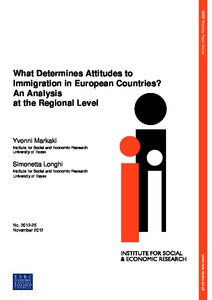What determines attitudes to immigration in European countries? An analysis at the regional level
"Different disciplines within the social sciences have produced large theoretical and empirical literatures to explain the determinants of anti-immigration attitudes. We bring together these literatures in a unified framework and identify testable hypotheses on what characteristics of the indiv...
| Main Authors: | , |
|---|---|
| Institution: | ETUI-European Trade Union Institute |
| Format: | TEXT |
| Language: | English |
| Published: |
Colchester
2012
ISER |
| Subjects: | |
| Online Access: | https://www.labourline.org/KENTIKA-19120007124919482899-What-determines-attitudes-to-i.htm |
| _version_ | 1771659897005408256 |
|---|---|
| author | Markaki, Yvonni Longhi, Simonetta |
| author_facet | Markaki, Yvonni Longhi, Simonetta |
| collection | Library items |
| description | "Different disciplines within the social sciences have produced large theoretical and empirical literatures to explain the determinants of anti-immigration attitudes. We bring together these literatures in a unified framework and identify testable hypotheses on what characteristics of the individual and of the local environment are likely to have an impact on anti-immigration attitudes.
Most of the previous literature focuses on the explanation of attitudes at the individual level. When cross country comparisons are involved the heterogeneity across countries is modelled by fixed or random effects in multilevel models. We analyse anti-immigration attitudes across regions of 24 European countries to explain why people living in different regions differ in terms of their attitudes towards immigration. We isolate the impact of the region from regressions using individual-level data and explain this residual regional heterogeneity in attitudes with aggregate level indicators of regional characteristics. We find that regions with a higher percentage of immigrants born outside the EU and a higher unemployment rate among the immigrant population show a higher probability that natives express negative attitudes to immigration. Regions with a higher unemployment rate among natives however, show less pronounced anti-immigrant attitudes." |
| format | TEXT |
| geographic | EU countries |
| id | 19120007124919482899_bd5a5050e96b461ab85eec21c66dcc86 |
| institution | ETUI-European Trade Union Institute |
| is_hierarchy_id | 19120007124919482899_bd5a5050e96b461ab85eec21c66dcc86 |
| is_hierarchy_title | What determines attitudes to immigration in European countries? An analysis at the regional level |
| language | English |
| physical | 37 p. Digital |
| publishDate | 2012 |
| publisher | Colchester ISER |
| spellingShingle | Markaki, Yvonni Longhi, Simonetta discrimination immigration public opinion What determines attitudes to immigration in European countries? An analysis at the regional level |
| thumbnail | https://www.labourline.org/Image_prev.jpg?Archive=111105793938 |
| title | What determines attitudes to immigration in European countries? An analysis at the regional level |
| topic | discrimination immigration public opinion |
| url | https://www.labourline.org/KENTIKA-19120007124919482899-What-determines-attitudes-to-i.htm |

